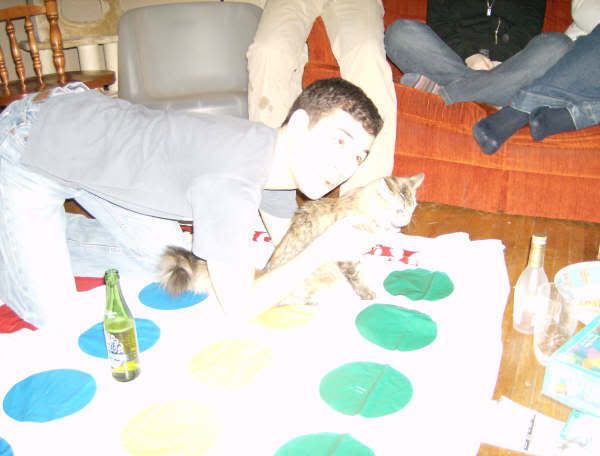 3. Y the Last Man #58
3. Y the Last Man #58by Vaughan (w) and Guerra (a)
I realize that my past few picks have all been "moment" issues, and by that I mean issues that are pretty cool in their own right, but have one particular moment that makes you go "holy [crap]" and sticks with you for a long time afterwards. Well, Y the Last Man #58 is another one of these "moment" issues, but it's the last one, I promise. In terms of moments, though, this issue probably delivered the most gut-wrenching (and rewarding) one of the year.
What exactly happens? Well, I'm not going to say, because if you haven't read it yet you'd be doing yourself a criminal disservice not experiencing it for yourself, and if you have you know exactly what I'm talking about. All I'm going to say is that Y the Last Man #58 is a testament to putting a time limit on a comic series (as opposed to continuing them indefinitely), as it allows you to get away with moments like the one found in this issue. Oh, and I'll also say that the moment in question is not only shocking in and of itself, but it's executed beautifully with expert pacing, and artist Guerra's mastery of conveying expression. The final shot in this issue left me with no small amount of goosebumps, and the odd tear.
But okay, let's look at the issue as a whole. The last four pages aside, Vaughan does a very good job building up this series to its inevitable conclusion, while still throwing in both twists and some solid character moments, such as Agent 355's scene in the dress shop and Yorick's moment with Beth. There's a feeling of suspense that's pretty much been creeping through the story for the past 3 or so issues, and #58 continues that feeling perfectly, so that readers find themselves unable to handle the thirty day wait before #59 (which was good as well, but failed to live up to this one).
While I'll admit that issue #60 (the final issue), which came out in 2008, was a better issue overall, it's going to be the events of issue #58 - the climax of the series - that people will talk about for years to come. Read this issue for yourself, but before you do, read issues #1-57 first.
 2. The League of Extraordinary Gentlemen: Black Dossier
2. The League of Extraordinary Gentlemen: Black Dossierby Moore (w) and O'Neill (a)
Quite frankly, I'm surprised this book hasn't made that big of a splash since its release. I mean, the fact that it's a new Alan Moore book alone should have been enough to get people talking, never mind the absolutely innovative approach he's taken here. One thing that makes Moore such a great writer, in my opinion, is the fact that he's always trying to challenge himself and push storytelling in new ways, and Black Dossier is probably the strongest example of this I've seen to date.
And okay, innovative is one thing, but it's not enough (like, innovative can still suck). But Black Dossier is also good. Really good. Italics good.
One of the main elements of Black Dossier, and indeed the entire League of Extraordinary Gentlemen series, is that all the main characters (actually, all the characters period) are literary figures. As with earlier incarnations of the League (see volumes one and two), Moore has developed a rich continuity that incorporates countless characters from literary (and a few other pop culture) sources, but does so in a way that feels natural, so you may be introduced to a character from, say, a 1940s serial and not even realize it. This is sort of refreshing when compared to most stories that try to do the same sort of thing without the subtlety. Sure, it works okay in Shrek and Fables, but remember those cringe-worthy scenes in Shanghai Knights when like Jackie Chan and Owen Wilson would meet someone and then the audience would find out that the person was historically significant (eg Charlie Chaplin and Arthur Conan Doyle) like it had anything do to with anything? Also, the main villain's name was Rathbone, if I remember correctly. Don't see Shanghai Knights.
But yeah, Moore (and O'Neill) do a great job fitting in hundreds of clever references, only a small percentage of which I actually caught. But the beauty of it is that, while it always feels cool to catch a reference in a sort of "ohh hey!" moment, the references that fly over the head don't detract from the story. In fact, part of the fun of this story was logging on to Wikipedia after every sitting and checking up on references I didn't get at first.
You may have noticed I referred to sittings in the last paragraph. That's because this book takes quite a while for the average reader to finish. It took me almost a whole week, and I tore into this voraciously. This is a welcome change of pace for people who are used to finishing a comic in about 10 minutes, or a graphic novel in about an hour. Reading this book is more of an experience. This is partly because, as in Watchmen, Moore switches between the story itself and "firsthand documents" from within the story. Only this time, Moore has sought to emulate the works of those before him in these documents, with truly impressive results. For example, there is a "lost folio" of a Shakespeare play involving characters from League that hits all the right notes of a Shakespeare play. Or a story where the League meet Jeeves and Wooster that feels like it was written by P.G. Wodehouse. The Sal Paradise section, however, was apparently not very convincing (according to my dad; I never read any Jack Kerouac, and still thought the section itself was really cool). Still, this created a very cool reading experience, and one that took a lot longer to get through. Also, there's a very awesome, albeit gimmicky, sequence at the end that made me very happy (hint: it involves 3-D glasses).
My one, one complaint with the story is with the final monologue of the story, which didn't ring true to me; more particularly, it felt unnecessary. I don't want to give too much away, but basically one of the characters turns to the audience and says "we're all fictional characters. We live in the imagination and we're significant in the development of humanity." That's a pretty glossed-over account, but it's essentially what I took with me from it. This sequence, as I mentioned, didn't do much for me, and actually hindered the story a little bit, as it drew unneeded attention to the man behind the curtain. The message itself felt like it had already been said in some capacity in - oh, I dunno - like every issue of Sandman.
Still, this was truly a unique book, one that immersed me when I read it and has stuck with me ever since. I really don't know why it hasn't been talked about more, though I do suspect it might have to do with its scarcity in Canada - the comic shop I frequent had to smuggle it in for me, which is why they charged me extra (at least, they told me they smuggled it in). It was worth the extra charge. This is one of my favourite hardcovers of all time.
 1. X-Factor #16
1. X-Factor #16by David (w) and Raimondi (a)
This won't be as long as my spiel on the Black Dossier, not because there's less to say about it, but because I read this story way back in February 2007 and don't have a copy of it on me, so I'm mostly speaking from memory. But anyways, X-Factor has been one of my favourite comics since issue #1 of the new series (though my love originated in Davd and Raimondi's Madrox miniseries). The stories have been interesting, the dialogue has some of the wittiest banter I've read in a comic (rivaled by maybe Joss Whedon), and the characters are incredibly charming, especially through their flaws. There have been a few hiccups along the way, admittedly. I wasn't a fan of how abruptly they got rid of interesting antagonists Singularity Investigations in the first arc, and the issue where Syrin is captured by that crazy guy didn't really hit the right notes with me. The inconsistency of the rotating artists (sometimes within an individual issue) got pretty distracting as well. That being said, though, issue #16 was executed perfectly, and has stood out ever since as one of the strongest individual issues of a comic that I've ever read.
The premise itself is interesting: previously, Jamie Madrox (aka Multiple Man), in what can only be described as hardcore multitasking, had created copies (or "dupes") of himself and sent them out into the world. The dupes would gain experience in various areas of life (such as detective work, or becoming a Shaolin monk) before returning for him to absorb them, along with their newfound experience. However, some of the dupes had become unreliable, and Madrox had resolved to go around and collect as much of "himself" as possible. This issue deals with him meeting one such dupe who had gone off, become a man of God, and started a family. What's more, the dupe will do everything in his power to avoid being reabsorbed.
So already we have a very intriguing conflict that incorporates superheroic elements, but addresses it in a very human way; for example, the story could have stood on its own, with only minor changes, as a tale of a man living on borrowed time, preparing for his own demise (think Everyman). There are a lot of moral and spiritual questions that poke themselves into the story: does the dupe has a right to stake his own claim in the world, at the expense of Jamie's fractured identity? Is borrowed time a blessing or a curse? All this is a metaphor for something... isn't it? David, obviously aware of these issues, complicates them by really humanizing the dupe. If, say, the dupe had been treated like a one-note character (like most of the other dupes), a lot of these underlying issues would be lost.
But instead, we get to see this dupe (James Maddocks) as a human being with a full range of emotions. We meet his family, we hear him talk about religion and philosophy, and wrestle with the implications of Jamie's arrival into his town. David really lets us get into James' mind, so that at the climax of the issue, when James is caught between conflicting ideological and self-preservationist instincts, and makes a decision that effectively seals his fate, the reader is heartbroken (this reader was, at least).
David and Raimondi have created a standalone thought-provoking story that spans a wide emotional spectrum, and they've done it in 22 pages. This issue really is an example of what the medium can accomplish - even in something as goofy as a super hero comic.
If you read this list and disagreed with my choice of the top 7 of 07, feel free to comment with what you feel was left out, or why not share with us your own list?

